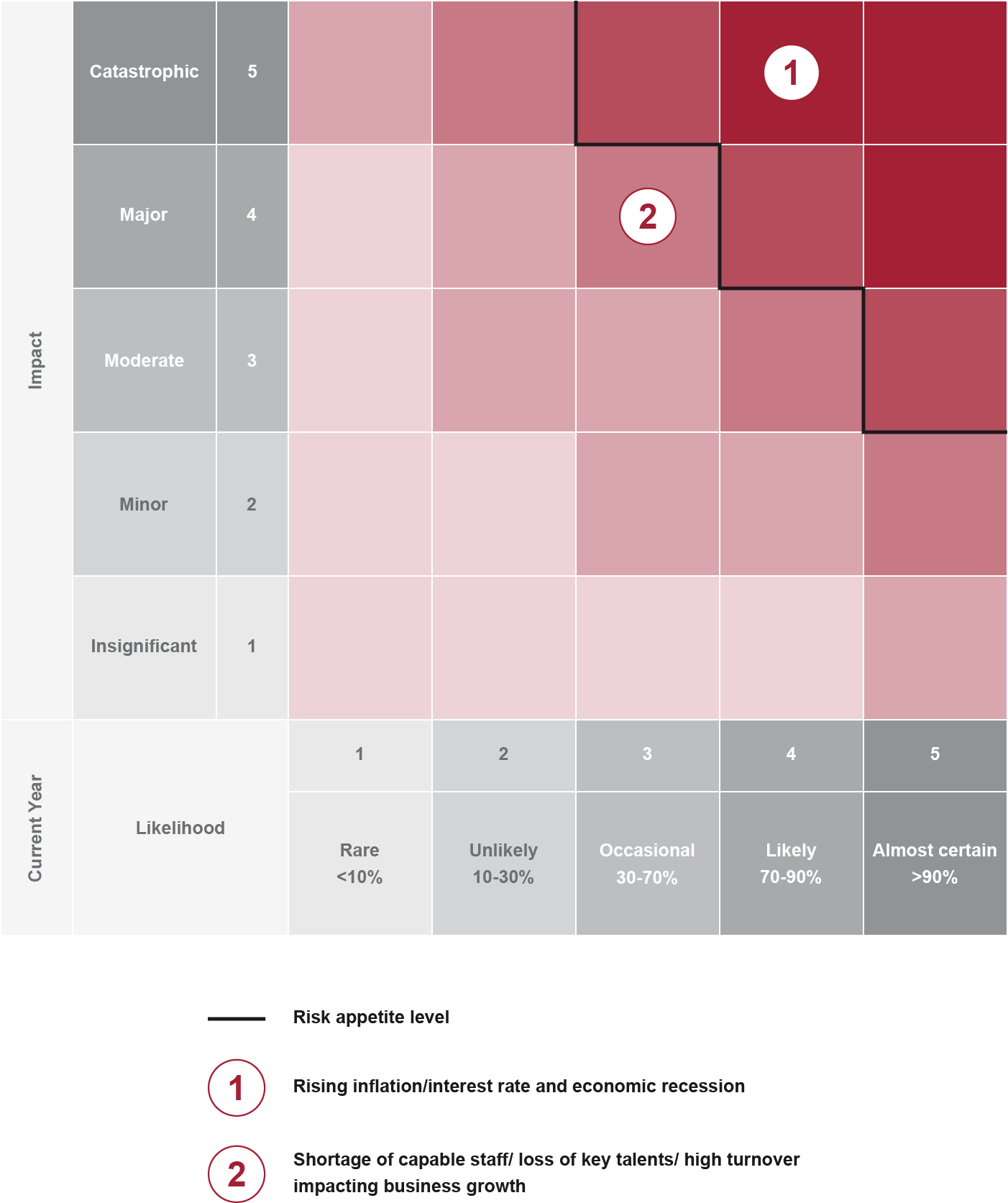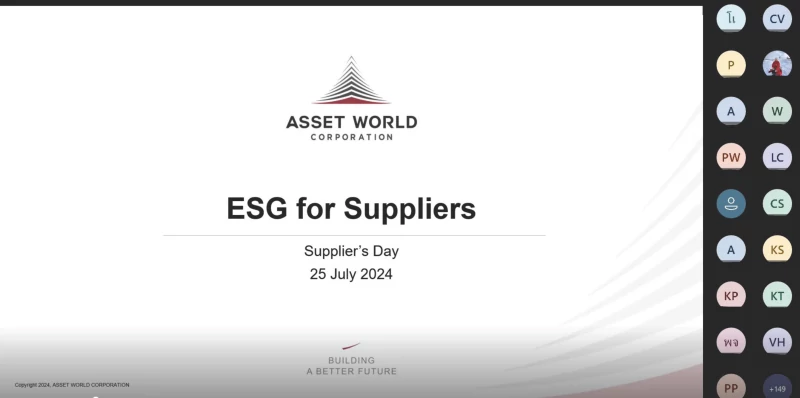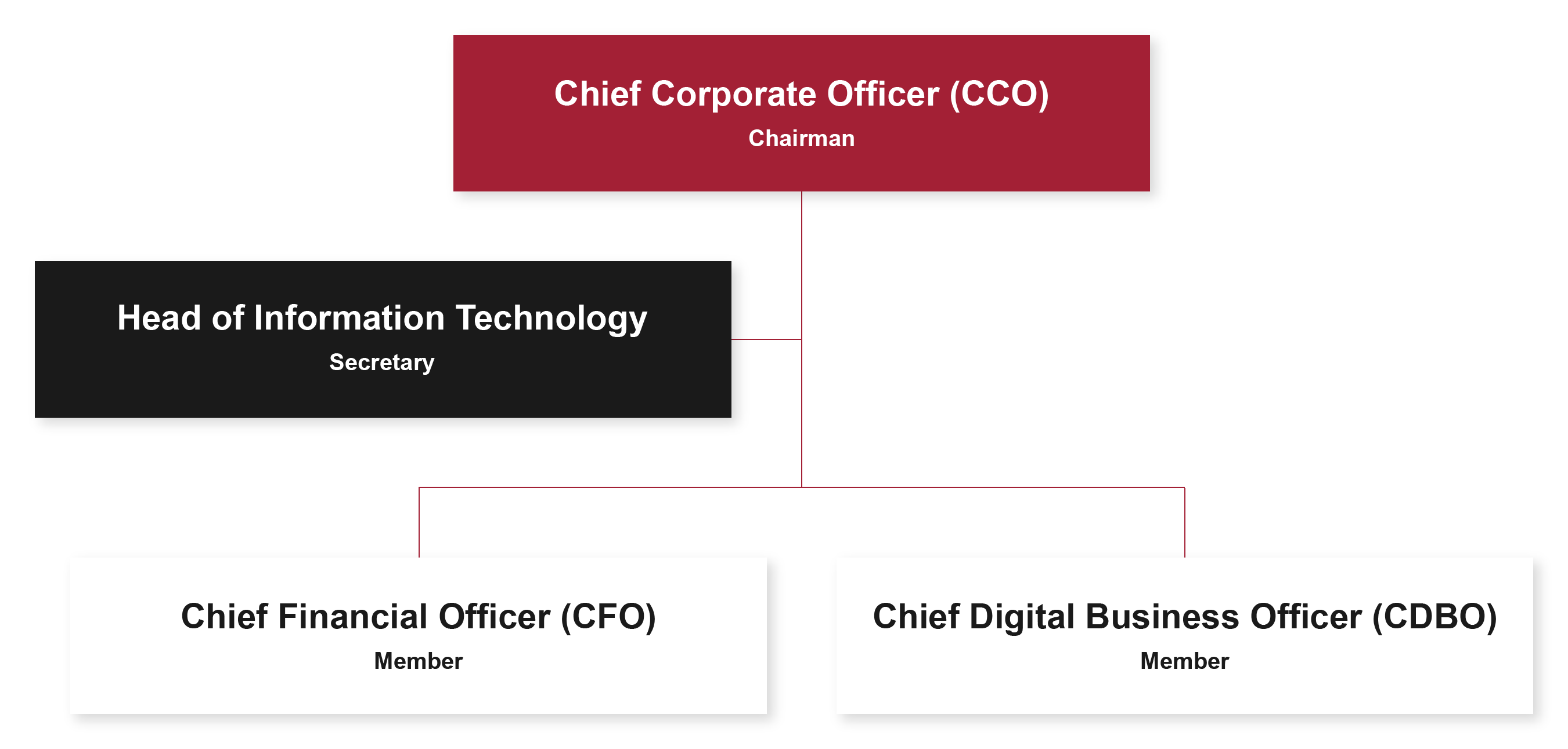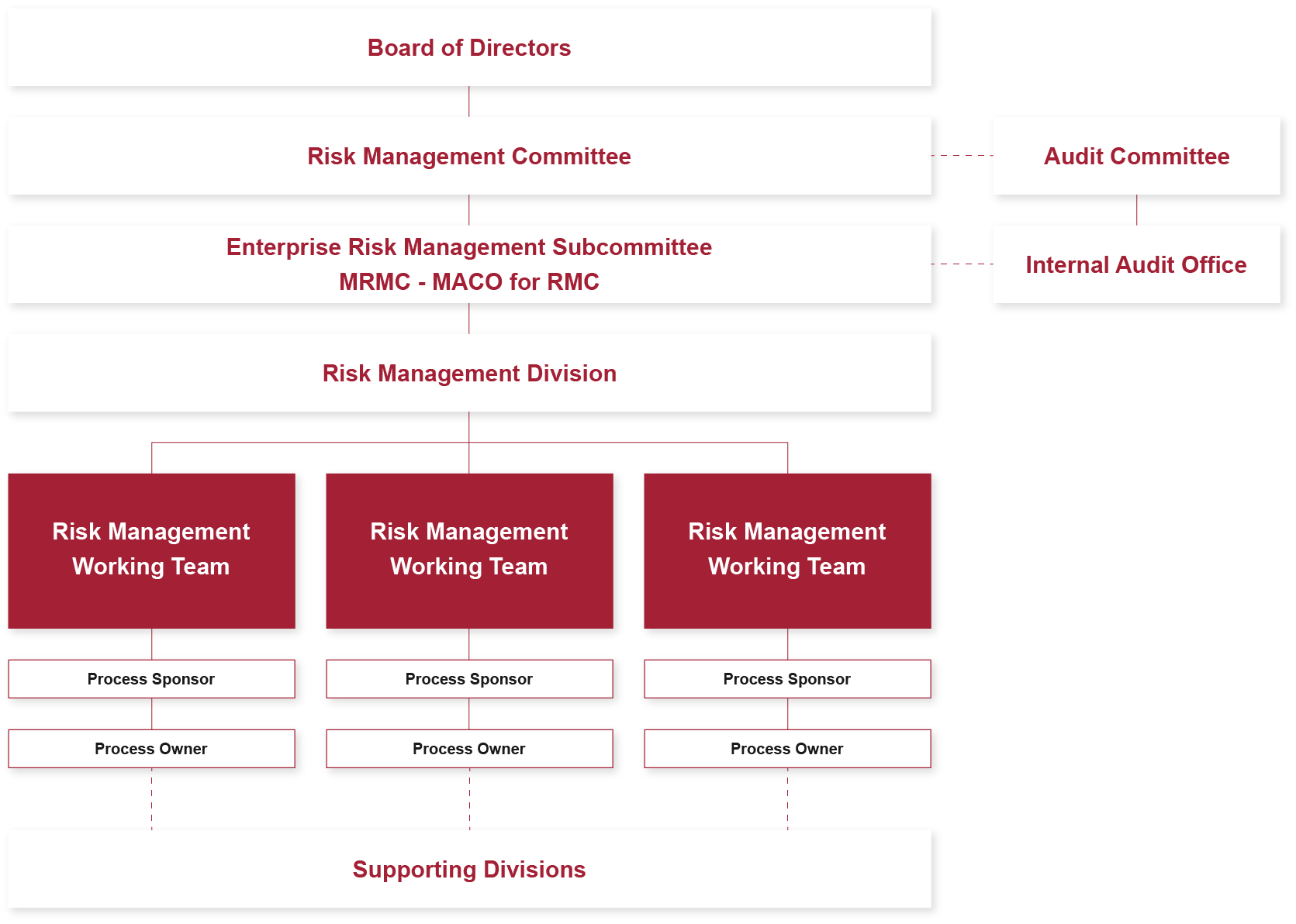BETTER Prosperity
Risk Management
AWC realizes and gives precedence to sustainable risk management across the organization, from the enterprise level to the operational level in every business unit. A risk and crisis management system was established to ensure that AWC will be able to continuously and effectively determine risks and opportunities for the company, as well as define appropriate strategy and mitigation plans to reduce probability and/or loss to be within acceptable levels and/or to take advantage of additional business opportunities.
AWC has established the Enterprise Risk Management Framework according to the international standard of The Committee of Sponsoring Organizations of the Treadway Commission or COSO Enterprise Risk Management 2017.
Risk Management Framework
Our company recognizes the critical importance of a robust risk management framework to identify, assess, manage, and mitigate risks effectively. Our framework is designed to ensure that risk management is an integral part of our strategic and operational processes, thereby creating sustainable economic benefits. We adhere to the Three Lines of Defense model, a recognized governance framework, to clearly delineate risk management responsibilities and accountabilities across the organization. The process will be oversighted by MRMC (at management level) and Risk Management Committee (board level) to ensure the accuracy.
Senior Management and Board Involvement
Our senior management and board of directors play an active role in the risk management framework. The board is ultimately responsible for overseeing risk management and setting the company's risk appetite. Senior management translates the board's strategic direction into operational policies and procedures, ensuring their effective implementation, execution, and monitoring. Regular reports on risk management activities and key risk indicators are presented to the board, facilitating informed decision-making and proactive risk management.
The Three Lines of Defense Model
1. First Line of Defense: Operational Management (Business Unit)
Operational management forms the first line of defense. Management and staff within the business units are directly responsible for managing risks and implementing necessary processes and controls. They own and manage risks on a day-to-day basis, ensuring that risk management processes are embedded in the operational activities of the company and that associated risks are managed at an acceptable level. Key responsibilities include:
- Identifying and assessing risks associated with their activities.
- Implementing risk mitigation strategies, processes and internal controls.
- Monitoring and reporting on the effectiveness of these controls.
2. Second Line of Defense: Risk Management, Compliance, Other Supporting Functions, and a dedicated committee.
The second line of defense consists of specialized risk management and compliance functions, extending to other supporting roles that provide oversight and support to the first line of defense. These functions develop and maintain risk management policies, related processes, frameworks, and templates, ensuring that the company's risk management practices align with the company strategic direction. Key responsibilities include:
- Developing risk management policies, procedures, and frameworks.
- Providing guidance, advice and support to operational management on risk-related matters.
- Monitoring compliance with risk management policies and regulatory requirements.
- Conducting risk assessments and reporting on risk exposures to senior management and the board.
3. Third Line of Defense: Internal Audit
The third line of defense is provided by the internal audit function at least in every 2 years, which operates independently of the first and second lines of defense. Internal audit provides assurance to the board of directors and senior management on the effectiveness of the company's risk management, control, and governance processes. Key responsibilities include:
- Conducting independent audits of risk management activities and internal controls.
- Evaluating the adequacy and effectiveness of the risk governance framework.
- Reporting audit findings and recommendations to senior management and the board.
- Following up on the implementation of audit recommendations to ensure continuous improvement.
Business Risk Factors
AWC owns real estate development and management projects encompassing 4 business groups including Hospitality Business, Retail and Commercial Building Business and mixed-use properties, including a large Wholesale Trade Center. In its business operations, AWC is fully aware that there are certain risks which may have a negative impact on the Company’s business, financial conditions, performance results and the Company’s prospects.
We are committed to maintaining a robust risk management framework that ensures the comprehensive identification and management of risks. Our approach is structured around a systematic process comprising five critical steps: Risk Identification, Risk Assessment, Control Identification, Mitigation Action, and Risk Monitoring and Reporting. This structured methodology allows us to proactively identify, assess, and manage potential risks, ensuring that our risk-related objectives are achieved effectively.
We take a rigorous approach to assessing our risk exposure, considering the unique factors inherent to our business and industry. As part of our risk assessment process, we employ a 5x5 matrix to evaluate the likelihood and impact of potential risks. This matrix allows us to systematically assess and prioritize risks based on their probability of occurrence and the magnitude of their impact.
The 5x5 matrix provides a structured method to gauge the potential severity of risks. These measures enable us to understand the potential outcomes if risks materialize, even though they do not inherently indicate the likelihood of such events. By categorizing risks on a scale from low to high likelihood and impact, we can effectively prioritize our risk management efforts and allocate resources to mitigate the most significant threats.
To further illustrate our risk exposure, we develop a risk heat map from this exercise (as shown below). The heat map visually represents the identified risks, highlighting areas of higher risk concentration and allowing us to focus our mitigation strategies accordingly. This tool enhances our ability to communicate risk exposure clearly to stakeholders and supports informed decision-making at all levels of the organization.
Risk Heat Map

For each identified risk, the Company aims to reduce the risk level to within the risk appetite (below the black line). This thorough evaluation process ensures that we are well-prepared to address risks that could materially affect our operations, financial performance, and strategic objectives. By continuously monitoring and updating our risk assessments, we strive to maintain a proactive and resilient risk management framework that supports our long-term sustainability and success.
The details of risk factors that the Company considers significant and may affect its business objectives are described as follows:
| Key Risks | Possible Impacts to AWC | Mitigation Plans |
|---|---|---|
| Strategic Risk | ||
| Changing Consumer Behavior and Business Competition (Hotels, Offices, Retail) |
|
|
| Key Risks | Possible Impacts to AWC | Mitigation Plans |
|---|---|---|
| Operational Risk | ||
| Operational Process Risks (e.g., inefficiencies, unclear workflows, poor data integration) |
|
|
| Construction Process and Quality Control Risks (e.g., poor workmanship, safety issues, regulatory non-compliance) |
|
|
| Shortage of capable staff / loss of key talents / high turnover impacting business growth (e.g., shortage of qualified personnel capable of supporting the company’s growth) |
|
|
| Cybersecurity Risks (e.g., data breaches, cyberattacks, unauthorized access) |
|
|
| Key Risks | Possible Impacts to AWC | Mitigation Plans |
|---|---|---|
| Financial Risk | ||
| Rising inflation / interest rate and economic recession (e.g., capital constraints due to inflation, rising interest rates, or market volatility) |
|
|
| Credit Risk from Tenants |
|
|
| Key Risks | Possible Impacts to AWC | Mitigation Plans |
|---|---|---|
| Compliance Risk |
|
|
| Key Risks | Possible Impacts to AWC | Mitigation Plans |
|---|---|---|
| Disaster Risk |
|
|
| Key Risks | Possible Impacts to AWC | Mitigation Plans |
|---|---|---|
| Reputational Risk |
|
|
| Key Risks | Possible Impacts to AWC | Mitigation Plans |
|---|---|---|
| Information Technology Risk |
|
|
| Key Risks | Possible Impacts to AWC | Mitigation Plans |
|---|---|---|
| Fraud Risk |
|
|
| Key Risks | Possible Impacts to AWC | Mitigation Plans |
|---|---|---|
| Emerging Risk | ||
| 1. Abrupt Climate Change (e.g., wildfires, flash floods) |
|
|
| 2. Adapting to Changing Employee Expectations (e.g., demand for flexibility, career growth) |
|
|
Risk Review
We recognize the importance of regularly reviewing our risk exposure to stay resilient against potential risks. To this end, we regularly conduct a review of our company risk profile at least quarterly. This includes comprehensive risk review ongoing risk monitoring and assessments of Key Risk Indicators (KRIs).
This dual-layered approach allows us to stay vigilant and responsive to any changes in the risk landscape that could impact our operations. By continuously monitoring our KRIs, we can detect emerging risks and shifts in existing risks, enabling us to make timely adjustments to our risk management strategies. This proactive approach ensures that our designated risk appetite and mitigating actions remain up-to-date and relevant, enhancing our ability to manage risks effectively.

Our commitment to frequent and thorough risk reviews underscore our dedication to maintaining a robust and adaptive risk management framework. This practice not only helps us mitigate potential threats but also supports the achievement of our strategic objectives and long-term sustainability.
Fostering Organizational Risk Culture
At AWC, we prioritize risk management in the development of new products and services and takes a proactive approach to integrate risk management in our company culture. Before launching any new product or embarking on new projects, such as the 'Pikul Application'—a brand-new lifestyle application designed to provide customers with a seamless experience in accessing services and exclusive privileges—we thoroughly consider the potential risks that could arise. We apply specific criteria to identify and address these risks early in the development process. This proactive approach helps us mitigate potential issues before they become significant problems, ensuring that our new offerings are both innovative and reliable, while also maintaining the high standards our customers expect.
To improve operational efficiency across the Company, management of the Company has prioritized embedding risk management and resilience practices within all business units. To achieve this, a collaborative process will be initiated in 2024 to establish key performance indicators (KPIs). Moreover, to further reinforce the importance of risk management, we have integrated risk-related goals into our company Key Performance Indicators (KPIs) named ‘Risk Management is managed in the most effective manner to minimize business and operation impact’ which aims to integrate the risk culture into all employees’ workflows. Therefore, Employee financial incentives are tied to the achievement of these risk-related goals, ensuring that all employees are aligned with the company’s risk management objectives. his may include the performance indicators such as the GHG reduction target 42% within 2030 which integrate into every related function and cascaded into individual KPIs, as identified as risk factors at corporate level. This alignment promotes a culture of risk awareness and accountability throughout the organization, driving our collective efforts towards effective risk mitigation and business success.
Key drivers will be tasked with fostering ownership and driving success across six key pillars:

This initiative gives our leaders and team managers the power to identify and address important risks effectively. This makes sure our actions align with what our stakeholders expect, and it strengthens our overall management practices. By being proactive about managing risks, we gain a competitive edge and ensure the Company's long-term success.
RAISING AWARENESS OF RISK MANAGEMENT WITHIN THE ORGANIZATION
In 2024, AWC provided the board of directors with a comprehensive training program on risk oversight. The program aimed to equip AWC’s board level with the knowledge and tools to effectively navigate potential challenges and ensure sustainable growth.
Key Topics Covered:
- Emerging Risks and Challenges
- Enterprise Risk Management Framework
- ESG Factors in Risk Oversight
- Effective Risk Governance Strategies
- Risk Management System
By participating in this program, AWC's board has gained valuable knowledge and tools to strengthen their oversight capabilities and ensure the company's future success
In addition, the Company has conducted training on sustainability risks for all employees to inform them of the current situation and trends in key risk management. The Company has also promoted knowledge and understanding among relevant employees at all levels regarding risk management in operational processes, from analysis, assessment, management, monitoring, and communication through online learning media, which employees can access and learn independently through the @core operating system. In addition, the Company has organized lectures and workshops on business continuity management (BCM) risk management for employees in various Company projects to make employees aware of potential impacts and prepare them to effectively respond to various situations.

Customer Relationship Management
Customers are key stakeholders to AWC. Customer relationship management is one of the most material topics because it directly impacts the economic dimension, affecting its sustainability. The customers’ needs keep changing while the company has to maintain the quality and safety of the products and services. Relationship management is not just about the company’s business growth, but it is also an important opportunity for the company to serve its customers better. Therefore, AWC strives to achieve high customer satisfaction in all business units by delivering high-quality services and products.
AWC has implemented Customer Relationship Management Programs with the customers and tenants across all business units, including Office, Wholesale & Retail, and Hospitality which defined policy, objectives, and procedures for developing long-term relationships with them. Additionally, AWC has developed a marketing strategy and programs, to expand our customer base. The program in 2024 including;
Customer Relationship Management
In order to gain a deep understanding of customer needs, improve service quality, and develop long-term relationships, AWC conducted a customer satisfaction survey on an annual basis. The survey uses questionnaires that evaluate key issues that linked to corporate strategy, such as market focus, products/services provided, knowledge management, and business performance.
| Customer Satisfaction Results | |||||
|---|---|---|---|---|---|
| Year | 2021 | 2022 | 2023 | 2024 | |
| Customer satisfaction result (%) | 74.35 | 73.63 | 77 | 80 | |
Supply Chain Management

AWC realizes the importance of sustainable supply chain management. With the increasing demands for more transparent, ethical, socially responsible, and environmentally friendly business operations, supply chain efficiency and sustainability ensure that AWC’s business operations run seamlessly while reducing and mitigating risks effectively and fulfilling the needs of our diverse customers. All these will enhance AWC’s competitive advantage over our competitors.
To ensure all emerging challenges are appropriately managed, AWC adopts the AWC’s Supplier Code of Conduct (SCoC) and disseminates to all suppliers. All suppliers are required to acknowledge the SCoC and return the acknowledgment form to AWC. Any supplier who fails to comply with the SCoC’s fundamental requirements will face different levels of action, including the termination of the supplier contract and removal from the AWC’s vendor in case that suppliers found incompliance with SCoC or have negative feedbacks without appropriated actions within the agreed timeframe.
Requirements stipulated in the AWC’s Supplier Code of Conduct include corporate governance, business ethics, human rights and labor practices occupational health and safety, and environmental management.
In order to ensure implementation of the SCoC and supplier ESG practices, Chief Strategic Marketing & Sustainability Officer and Chief Corporate Officer have been appointed to provide strategic directions and oversee procurement practices as well as supplier ESG performance in alignment with AWC sustainability strategy and long-term target. In addition to the implementation of the SCoC which is endorsed by the Board of directors, AWC also develops the policy for vendor selection and Green Procurement Policy to emphasize our commitment to creating sustainable supply chain management. Moreover, AWC also arranges the internal sharing of knowledge for the procurement team in order to make them understand their role and responsibility in the development of sustainable procuremen.
SUPPLY CHAIN MANAGEMENT STRATEGY
To ensure that our supply chain management are supporting business strategy and business growth direction, AWC has established the following four Supply Chain Management Strategies to promote AWC’s strength and leverage suppliers’ ESG standards
| Key ESG Objective | ESG requirements in supplier selection and contract | Link to SCM Strategy |
|---|---|---|
| Safety Standard Enhancement | Occupational Health and Safety Compliance is one of the supplier evaluation criteria in which all suppliers are com new vendor evaluation form. In addition, AWC recognizes the importance of an increasing demand for the third - party verification/audit . Any supplier/vendor who submit the third- party verification/audit report will score higher than those who do not submit such report. It is also noted that any non – compliance of OHS standards/requirements is identified/found, the supplier/vendor shall be facing 2 points deduction from the supplier evaluation activity |
|
| Effective Fraud Prevention | Fraud prevention is one of the issues AWC will not be tolerant and strongly emphasize as having been echoed in Our Codes of Conduct as well as the Supplier’s Code of Conduct. To prevent fraud throughout our supply chain, AWC requires improved control measures and due diligence process for both company wide and throughout supply chain. |
|
To ensure that our strategies are being executed accordingly, AWC has set the KPIs to measure the success for strategies implementation
- 100% of significant / critical tier 1 suppliers acknowledged the SCoC and ensure the effective implementation of the SCoC
- 100% of significant / critical tier 1 suppliers have mitigation plans and risks are addressed within 12 months
- 100% of significant / critical tier 1 suppliers strictly comply with safety and environmental-related laws and standard
- 100% of the suppliers from the Approved Vendor List will be requested to conduct the desk assessments through self-questionnaire which was developed aligned with international standard e.g. ISO14000, ISO18000, ISO26000 or relevant
SUPPLIER MANAGEMENT
AWC has a transparent and ethical supplier management system. The system is for the recruitment of qualified vendors/suppliers, building and maintaining long-term good relationships with vendors, and increasing customer satisfaction. The management system cover.
SUPPLY CHAIN MANAGEMENT PROCESS
SUPPLIER CODE OF CONDUCT
Asset World Corp Public Company Limited or AWC has developed a Supplier Code of Conduct or SCoC, which sets out minimum standards and practices for our suppliers. The following principles have been stated in the ScoC:

The SCoC will be disseminated to suppliers, along with a standard procurement contract. Suppliers must acknowledge and strictly comply with the principles set forth in the SCoC. Should there be any non-compliance, misconduct, or violation against the SCoC, the supplier is subjected to a different level of penalty. The company reserves the right to suspend, terminate the contract, amend specific contractual terms, and remove a vendor from the approved vendor list.
To support effective implementation, the company provides comprehensive training for our procurement team, relevant internal stakeholders and all significant supplier through workshop, emphasizing understanding on AWC’s Sustainability strategy and their crucial roles in the supplier ESG programs. This training equips them with the necessary knowledge and tools to assess, monitor, and enforce supplier compliance with the SCoC.
In addition to AWC’s SCoC that has been given out to our suppliers, AWC also encourages our suppliers to develop their own SCoC and disseminate it to their own suppliers or contractors. This is to create a sustainable impact throughout the supply chain.
In 2024, 100% of critical tire-1 suppliers acknowledge and strictly comply with the SCoC
SUPPLIER CODE OF CONDUCT AND PRACTICES
AWC’S SUPPLIER
AWC's supply chain include all supplier in operation phase who are manufacturers, goods and materials providers, service providers, and distributors.
SUPPLIER SELECTION AND EVALUATION
AWC has established systems to screen new vendors through the Supplier Registration Form (External Vendor Onboarding Form) and to review current suppliers' qualifications through the 'Supplier Performance Evaluation Form.' These form has integrated ESG criteria and review on regular basis in which align with Supplier Code of Conduct (SCoC) to ensures that our suppliers will have sufficient capacity to deliver the best value to AWC and our stakeholders throughout the value chain.
Criteria to Screen New Vendor in Supplier Registration Form (External Vendor Onboarding Form)
- Financial Status
- Warranty and Quality Control
- Trustworthy
- Non-blacklisted
- Free from conflict of interest with AWC’s businesses
- Alignment with relevant ESG standards, including ISO 14000, ISO 26000, and ISO 45000
- Following the principles of good corporate governance
Suppliers undergoing the selection process must achieve 80-100% of assessment scores to pass the selection criteria. ESG criteria will be weighted at 20% of the total score.
In addition, AWC also conducts current supplier performance evaluations upon completion of service or product delivery through the 'Supplier Performance Evaluation Form.' ESG criteria will be weighted at 10% of the total score.
Criteria to evaluate the current supplier in ‘Supplier Performance Evaluation Form’ which develop with framework iso 14001 ISO 45001 ISO 14064-1
- On-time delivery of completed products/services
- Quality of products/services and personnel
- Etiquette in communication and ease of coordination
- Compliance with building rules and regulations
- Commitment to the environment, health, safety, social responsibility, security good corporate governance, and sustainability
SUPPLIER SCREENING
Supply chain management is at the heart of the Company’s business operations, providing a competitive advantage, fulfilling consumers’ needs, and mitigating business risks. To deliver a sustainable solution to the value chain, vendors and suppliers play an essential role as AWC relies on those business partners to run the business smoothly.
In order to manage the risk that could occur by the supplier and classify the significant supplier. The company divided suppliers following the criteria of;
- The result of the current suppliers’ evaluation
- Country-specific risk: 99% of supplier of AWC’s suppliers located in Thailand
- Sector-specific risk: divided into eight industries:
- Food & Agro-Industry
- Consumer Products
- Insurance and Financials
- Industrials
- Property & Construction
- Resources
- Services
- Technology
- Commodity: classify into type of product and service
- Agribusiness
- Food & Beverage
- Fashion
- Home & Office Products
- Personal Products & Pharmaceuticals
- Banking
- Finance & Securities
- Insurance
- Automotive
- Industrial Materials & Machine
- Packaging
- Paper & Printing Materials
- Petrochemicals & Chemicals
- Steel
- Construction Materials
- Construction Services
- Property Development
- Property Fund & Real Estate Investment Trusts
- Energy & Utilities
- Mining
- Commerce
- Health Care Services
- Media & Publishing
- Professional Services
- Tourism & Leisure
- Transportation & Logistics
- Electronic Components
- Information & Communication Technology
AWC has different management approaches for different categories of suppliers, apart from some specific common practices. AWC has communicated expectations for more transparency, and ethically sound and environmentally friendly business operations in its supply chain to deliver higher standards in our value chain. AWC aims to improve its supply chain management and make vendors more sustainable together.
In the procurement process, AWC adheres to transparency and accountability principles. In addition, we have integrated the sustainability requirements in the pre-tendering stage such as occupational health and safety (OHS) requirements, the promotion of the use of environmentally friendly goods and services such as recycled materials whilst adhering to design standards
For AWC, we classify our suppliers into 3 categories in order to understand the suppliers who have a significant impact on AWC’s competitive advantage, market success, and business operation.

3 categories of suppliers are;
1. Tier-1 supplier
- all suppliers who are directly engaged in business directly
2. Significant/critical tier-1 suppliers:
- Direct suppliers with 80% of total spend on suppliers in tier-1
- Non-substitutable suppliers, such as advanced construction and engineering suppliers; and suppliers of products that are difficult to source from elsewhere, are considered critical components or equipment in production.
- Suppliers involving a high-risk level include Environmental, social, and governance (ESG) aspects. Examples are Suppliers with long-term contracts, non-substitutable specialization and expertise in advanced engineering, and high spending who may affect AWC production and service
- Suppliers of equipment or services critical to production with large purchase volumes.
- Suppliers of equipment or services of high value that are critical to production
3. Significant/Critical non-Tier 1 Suppliers
- Suppliers who do not engage in business directly with AWC but engage in trade with AWC's suppliers. They are selected from a list of suppliers of AWC Critical Tier 1 Suppliers.
Supplier Proportion
| Supplier Screening | Suppliers |
|---|---|
| 1.1 Total number of tier-1 suppliers | 2,952 |
| 1.2 Total number of significant tier-1 suppliers | 62 |
| 1.3 Total number of significant non-tier 1 suppliers | 0 |
SUPPLIER ASSESSMENT AND EVALUATION
In order to ensure ESG risk control, AWC conducts an annual supplier audit, based on type, expenditure, and the risk levels of the ESG risk assessment result. All of the suppliers from the Approved Vendor List will be requested to fill self -assessment questionnaire and desk assessment covering all criteria specified under supplier evaluation form and against the SCoC. The assessment criteria are designed to evaluate suppliers' overall ESG management and business performance incorporating principles aligned with recognized international standards such as ISO 14001, ISO 26000, and ISO 45001. Following the self-assessment, AWC’s procurement team conducts a thorough desk review, cross-referencing the self-reported data with supporting documentation to ensure accuracy of responses as well as to evaluate their operational risks related to ESG that could impact AWC’s operation and reputation.
The assessment also aims to identify areas for improvement, ensuring that supplier practices remain in continuous alignment with AWC’s sustainability objectives. In addition, AWC conducts on-site ESG audits to evaluate sustainable risks at the significant/critical suppliers’ operational sites. This includes criteria such as hazard identification and risk assessment (HIRA), focusing on issues like employee injuries from chemicals, workplace environment, machinery usage, and ESG Standard compliance. Initially, the Company selects suppliers for on-site sustainable risk assessments based on criteria such as having over 80% of purchasing volume with the Company and whose operations are likely to have or cause negative ESG impacts (ESG High-risk suppliers) which brought the result from desk review in ‘Supplier Performance Evaluation Form’ and ‘Supplier ESG risk self-assessment’
In 2025, the Company identified no significant economic, social, or environmental risks arising from significant suppliers.
SUPPLIER EVALUATION CRITERIA AND MANAGEMENT GUIDELINES OF THE COMPANY

Additionally, in case supplier is found with negative feedback, the company summary finding and provide corrective action plan outlining the steps to address the identified issues. The company will also provide necessary support to the supplier, including knowledge sharing and implementation guidance, to facilitate the implementation of the corrective actions and prevent recurrence.
Supplier Relationship Management and Capacity Development
AWC prioritizes sustainability and strong partnerships with its suppliers. AWC goes beyond just transactions by actively supporting suppliers' growth and capabilities. This approach benefits both parties: AWC fosters a resilient supply chain aligned with its goals, while suppliers gain the skills and knowledge to adapt to challenges and thrive in the market, promoting sustainable development together.
AWC has provided tailored training and long-term capacity building program for all significant suppliers. Each training session is designed based on common findings from our supplier assessments, supplier interests, current sustainability trends, and our company’s sustainability strategy. This program ensures that our suppliers are equipped with the necessary skills and knowledge to integrate sustainable practices into their operations, aligning with our commitment to building a resilient and sustainable supply chain. Example of supplier activities done in 2023-2024 includes:
Supplier Capacity Development

Supplier’s Day 2024
On 25th July, 2024, AWC hosted a supplier capacity-building program ‘Supplier’s Day 2024’ focused on understanding the Supplier Code of Conduct and sustainable procurement practices. AWC aims to cultivate a culture of sustainability throughout its entire network. This collaborative approach ensures that both AWC and its suppliers operate in an environmentally and socially responsible manner.
Supplier Relationship Management and Capacity Development
AWC prioritizes sustainability and strong partnerships with its suppliers. AWC goes beyond just transactions by actively supporting suppliers' growth and capabilities. This approach benefits both parties: AWC fosters a resilient supply chain aligned with its goals, while suppliers gain the skills and knowledge to adapt to challenges and thrive in the market, promoting sustainable development together.
Information and Data Security
AWC is committed to conducting business responsibly with regard to personal data security and adhering to good governance principles, strictly complying with relevant laws, regulations, rules, and procedures. The Company applies and adopts relevant international practices and standards for data and information security, while also transparently disclosing information to all stakeholders. In addition, AWC emphasizes building a robust system and measurement to protect data and adapting to new threats to maintain trust with customers and stakeholders.
AWC has established an Information Technology Sub-Committee (IT Sub-Committee) composed of experienced executives with expertise in technology and information, led by the Chief Corporate Officer (CCO), who serves as the Chairperson of the IT Sub-Committee, with the Chief Financial Officer (CFO), the Chief Digital Business Officer (CDBO), and the Head of Information Technology as members, and the IT Secretary as the Secretary. This structure ensures that the use of information technology and investment aligns with the objectives, and regulations set by the Board of Directors, and resolutions of the shareholders. The Information Technology Sub-Committee is required to meet in the third week of every month and must notify the Board of Directors of the meeting at least seven days in advance. It is primarily responsible for overseeing the security of data and information within the Company, as follows:
- Evaluate and review the strategy, structure, security, policies, processes, and procedures for information technology operations.
- Prioritize current and new projects, including eliminating duplication.
- Monitor, review, and reassess both current and new information technology projects, including budget spending and benefits received.
- Report progress on information technology strategy, projects, policies implemented, and non-compliance with key information technology requirements to the Management Committee (MACO).
IT Steering Committee

Security Awareness
AWC raises awareness about personal data protection through internal communication and training, including internal compliance audits.
The Information Technology Division has installed a data leak prevention system to mitigate risks. The Company has developed an information and security incident response plan to systematically manage information and security issues. This plan will enable employees and external parties (contractors) responsible for storing AWC's data and information to effectively cope with potential incidents.
Furthermore, AWC has developed a data leak prevention system to reduce the risk of data breaches and improve the efficiency of IT infrastructure. This includes data leak prevention, endpoint protection, data classification, data encryption, and email security. Additionally, the Company fosters a culture of responsible data use, further enhancing the efficiency of IT infrastructure. AWC has raised awareness of data protection, communicated emerging IT news through newsletters, and conducted internal audits.

Information and Data Security Incident Response Plan
AWC developed Information and Data Security Incident Response Plan to systematically manage issues related to information and data security. This incident response plan is designed to be applicable for AWC and external party (contractor) that responsible for storing AWC’s information and data.
AWC Data Leak Prevention system is developed to minimize the risk of data breaches while improving the IT infrastructure efficiency. With strict ethical data usage practice, AWC builds a culture of responsible data use to enhance IT infrastructure efficiency. The company raises awareness about data protection, communicates the emerging IT news via newsletter, and conducts an internal inspection.
We conduct regular testing of our systems at least semi-annually, which includes evaluation of an incident response plan, a disaster recovery plan, a data leak prevention system, and performance of security tests on the core business applications using the Penetration Testing Technique. This process enables the AWC to detect any potential vulnerabilities in the systems and implement essential upgrades or modifications as needed.
AWC assures our stakeholders that we are well prepared for any potential information technology related crises that may occurs.
IT and Cyber Security Performance
| 2021 | 2022 | 2023 | 2024 | |
|---|---|---|---|---|
| Total number of information security breaches | 0 | 0 | 0 | 0 |
| Total number of clients, customers and employees affected by the breaches | 0 | 0 | 0 | 0 |
Our Approach to Tax
AWC is committed to long-term value creation for all stakeholders and responsible corporate citizenship. Our tax practices align with our company values and adhere strictly to all applicable tax laws and regulations in our operating jurisdictions. We interpret tax legislation in its true spirit and intent, avoiding any opportunities for exploitation. This tax policy has been endorsed by CEO as a member of Board of Director.
Responsible Tax Compliance
We aim to pay an appropriate amount of tax according to where value is created within the normal course of commercial activity. Any transfer pricing is calculated using the “arm’s length principle”. We also commit not to transfer value created to low tax jurisdiction and not to use tax structures without commercial substance.
We strive to be good force to enhance strong value chain towards sustainability, building a better future together.
Reasonable Tax Planning
AWC does have a responsibility to our shareholders, employees, and business partners to ensure that we do not incur unnecessary or unintended tax liabilities which would damage our business.
This means that we will engage in reasonable tax planning to ensure we are not taxed multiple times on the same profits or transactions, and that we do not fall into any unintended tax traps exposing ourselves to taxes higher than those intended by legislation.
We would also take advantage of tax incentives or exemptions that are provided for in a jurisdiction’s legislation, where we are able to do so. We will not engage transactions which can represent any form of financial crime, tax evasion, or facilitation of tax evasion. In addition, we will not transfer value created to low tax jurisdictions, use secrecy jurisdictions or tax havens for tax avoidance, or use tax structures without commercial substance.

Appropriate Transfer Pricing Practice

We aim to pay an appropriate amount of tax according to where value is created within the normal course of commercial activity. Any transfer pricing is calculated using the “arm’s length principle”.
We strive to be good force to enhance strong value chain towards sustainability, building a better future together.
Organization Contributions
AWC strategically engages with key industry organizations, including chambers of commerce and tourism-related associations, to advance its corporate objectives. These contributions support pro-business policies, strengthen domestic and international business networks, and promote sustainable tourism development across Thailand, reflecting the company’s commitment to long-term economic growth and responsible business practices.
| Organization Group | Organization Contribution (THB) | |||
| FY2021 | FY2022 | FY2023 | FY2024 | |
| Chambers of Commerce | 107,331 | 433,883 | 54,016 | 671,700 |
| Tourism-related Associations | 8,880 | 253,673 | 525,559 | 766,328 |
| Total Contribution | 116,211 | 687,556 | 579,575 | 1,438,028 |
AWC did not make any contributions to and spending for political campaigns, political organizations, lobbyists or lobbying organizations, and other tax-exempt groups, in accordance with Anti-Corruption Policy.
Engagement and Contributions to Key Industry Organizations
AWC actively supports key industry organizations, including chambers of commerce and tourism-related associations, to advance its strategic objectives. Through these engagements, the company strengthens business networks, promotes pro-business policies, and contributes to sustainable tourism development in Thailand, reflecting its commitment to long-term economic growth and responsible business practices.
| Strategic Objective | Engagement Focus | Total Contribution (THB) |
|---|---|---|
| Strengthen domestic and international business networks | AWC actively engages with multiple chambers of commerce, including Australian-Thai, American, British, and Thai Chambers. Through these memberships, the company advocates for pro-business policies, strengthens domestic and international business networks, and supports initiatives that contribute to Thailand’s economic growth. | 671,700 |
| Support sustainable tourism development across Thailand | AWC participates in national and local tourism and hospitality associations, such as the Thai Hotel Association and Thailand Incentive and Convention Association. These engagements help promote industry standards, improve hotel service quality, enhance operational efficiency, and support sustainable tourism development across Thailand. | 766,328 |
Largest Expenditures
| Rank | Organization | Type of Organization | Role and Activities | Contribution (THB) |
|---|---|---|---|---|
| 1 | Thai Hotel Association | Trade association | The Thai Hotel Association represents and supports the hotel industry in Thailand. Its primary role is to promote high standards of service, enhance operational efficiency, and strengthen marketing and sales capabilities of member hotels. THA also advocates for policies that foster sustainable tourism development and helps its members achieve a consistent and reliable star-rating system nationwide. | 237,553 |
| 2 | Thailand Incentive and Convention Association | Trade association | Thailand Incentive and Convention Association (TICA) is dedicated to developing and promoting Thailand’s incentive travel, meetings, and convention industry. The association facilitates networking, sets industry standards, organizes training and certification programs, and supports events that boost Thailand’s reputation as a leading destination for business and incentive travel. Its mission is to enhance the professionalism and competitiveness of the sector while ensuring sustainable growth. | 236,696 |
| 3 | American Chamber of Commerce | Trade association | American Chamber of Commerce (AmCham Thailand) serves as a platform for U.S. and Thai businesses to strengthen bilateral trade and investment relations. Its key functions include advocacy for pro-business policies, providing market insights and networking opportunities, and supporting initiatives that promote economic growth and competitiveness in Thailand. The chamber helps members navigate regulatory environments and fosters collaboration across industries and sectors. | 216,630 |
Responsible Climate Lobbying
AWC is committed to growing responsibly reducing negative impacts while contributing positively to Thailand’s economy, society, and environment. We actively collaborate with national and international associations to promote sustainable development, shape public policy, and advance climate action in line with the Paris Agreement, Thailand’s NDCs, and the Science-Based Targets initiative (SBTi).
Learn more about our Responsible Climate Lobbying and Policy Framework in the document.

